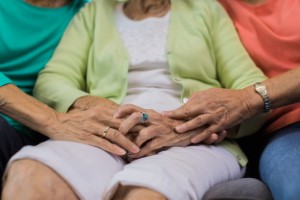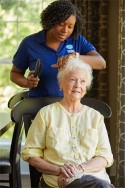Quality End-of-Life Care Services in Grapevine, Texas
Comfort Keepers
The end-of-life caregiving journey can be immensely difficult, both emotionally and physically. Fortunately, family caregivers don’t have to go through it alone. At Comfort Keepers of Grapevine, our team of compassionate caregivers can assist in providing top-notch end-of-life care to your loved one to help support their quality of life until the very end.
What is end-of-life care?
End-of-life care is the general term used to describe the medical and social care someone needs as they are approaching death.1 This kind of care is not one-size-fits-all – rather, it is uniquely catered to each and every individual who needs care and support during their journey towards the end of their life.
 This kind of care can therefore vary in terms of specific needs, the various members of the caregiving team involved, as well as length of care. For some, end-of-life care is only needed for a few days, while others, it may last for months.
This kind of care can therefore vary in terms of specific needs, the various members of the caregiving team involved, as well as length of care. For some, end-of-life care is only needed for a few days, while others, it may last for months.
The main goal of end-of-life care is to support the person’s quality of life as their physical state declines, whether their condition(s) can continue to be treated or not.
Our compassionate caregivers are trained and experienced in dealing with these situations and working with seniors, families and medical professions to help provide comfort and relief in what can be a stressful time. Call us today and find out how we can help your family.
What are the different kinds of end-of-life care?
End-of-life care is more of an umbrella term used to describe various kinds of support a person may receive in their final stage of life. Here are the most common types.2
Palliative Care
Palliative care is additional care given to those with serious illnesses or conditions (such as cancer, for example). This care is designed to enhance and support the medical care a person is already receiving for their illness, while also improving the person’s quality of life. In addition, this care often benefits the family of the person being cared for, as they have support and assistance in the caregiving, as well as the peace of mind that their loved one is receiving the additional care and support they need.
Hospice Care
Hospice, however, is chosen when it is clear that attempts to medically treat and stall/cure an illness are not working. In hospice care, these treatments are therefore stopped and the illness is allowed to run its natural course. During this time, efforts are entirely focused on supporting the person’s quality of life through their decline. Families also benefit from this kind of care, as they are supported during a difficult time of grief and anticipating loss.
What are some common myths about hospice care?
Hospice care gets a bad rap, especially for those unfamiliar with end-of-life care. Some of the most common myths we hear are:
“Hospice care means you’re just giving up on your loved one.”
“Hospice care is too expensive.”
“Hospice care always means ‘the end’.”
The bottom line is, hospice care has a very pointed purpose: supporting the last stage of someone’s life as they battle an uncurable condition. The decision to enter into hospice care is taken very seriously, and is particularly designed for the unique person receiving the care.
 There have been instances where someone’s health improves, and they are able to revert back to palliative or even regular medical care. However, it most often ends as it is expected to.
There have been instances where someone’s health improves, and they are able to revert back to palliative or even regular medical care. However, it most often ends as it is expected to.
While this experience is difficult, Comfort Keepers of Grapevine is here to make it less so, and to support you and your loved one in their greatest time of need.
To learn more, click here for some Frequently Asked Questions about hospice care.
What are the benefits of in-home end-of-life or hospice care?
Aging in place, or receiving care and support in one’s own home, is becoming increasingly popular for a reason. Not only is it often more cost effective and practical for both the senior and their families, but they receive the care they need from the comforts of their own space.
This is especially true for those seeking end-of-life care. A report from 2020 found that over 51% of hospice deaths occur at home.3 In-home care amplifies the comfort and quality of life one can receive while receiving hospice care.
How can Comfort Keepers Caregivers help?
Besides end-of-life care, our caregivers are able to help with a number of needs your senior may have. This includes but is not limited to:
- Light housekeeping
- Grocery shopping and nutritious meal preparation
- Personal care and assistance with bathing and other hygiene activities
- Transportation to appointments
- Companionship
- And more!
Want to get started or learn more? Contact us!
Whether you’re looking for end-of-life care or are curious about other in-home care services we provide, visit our website here or call us at (817) 282-0828 today!
References












